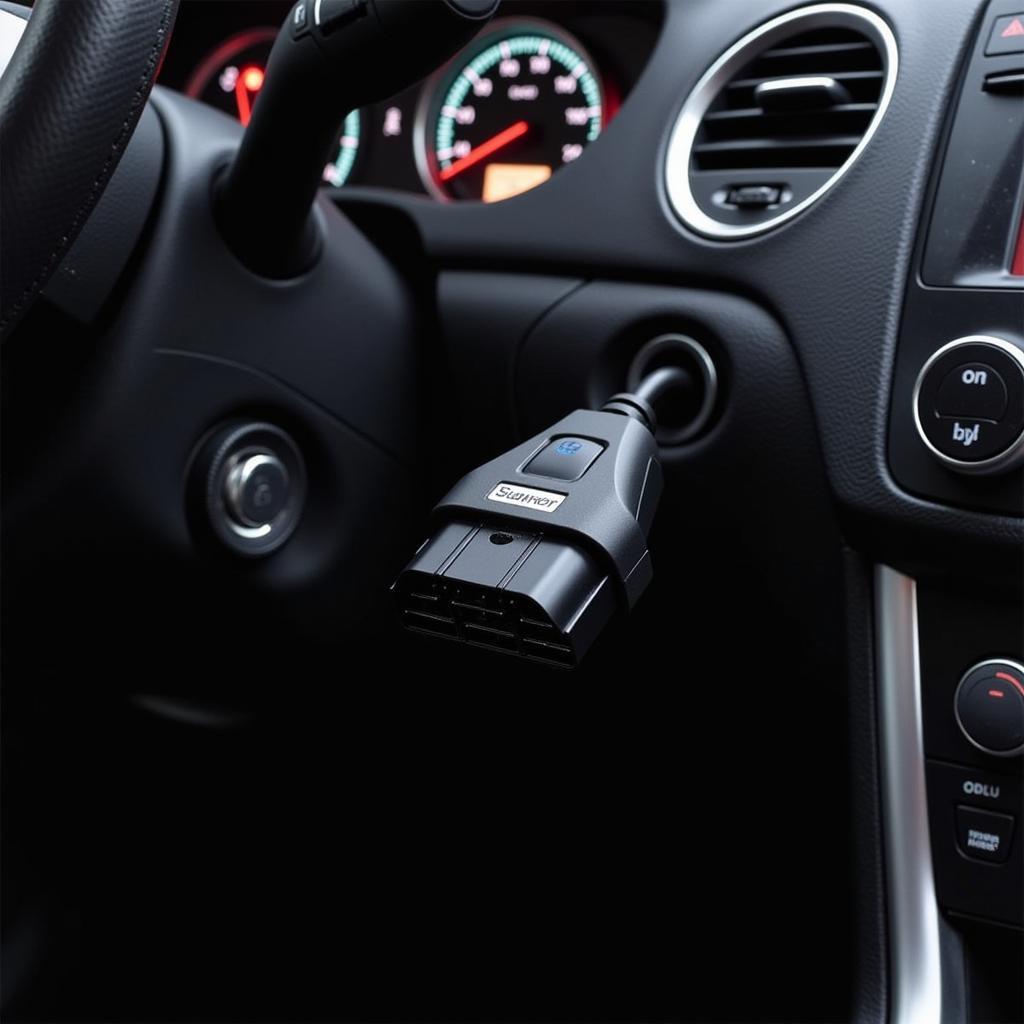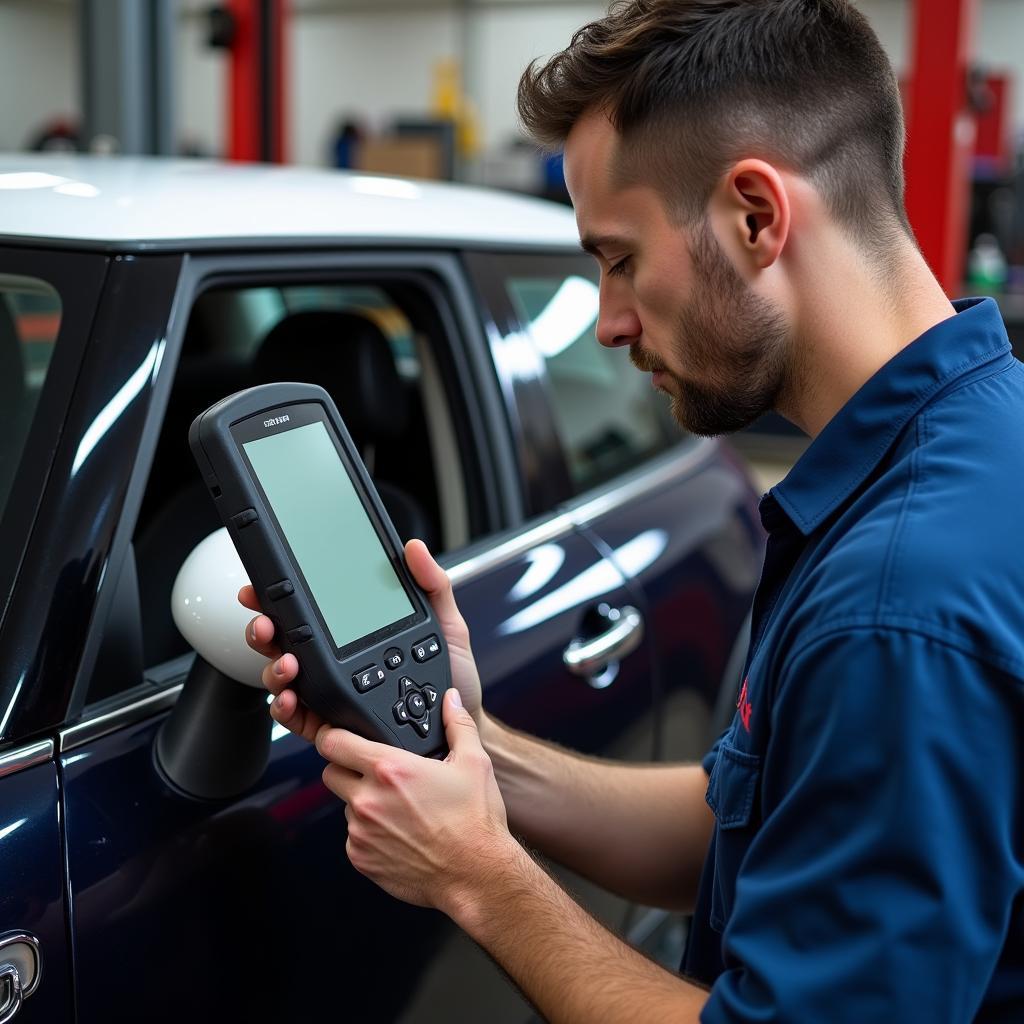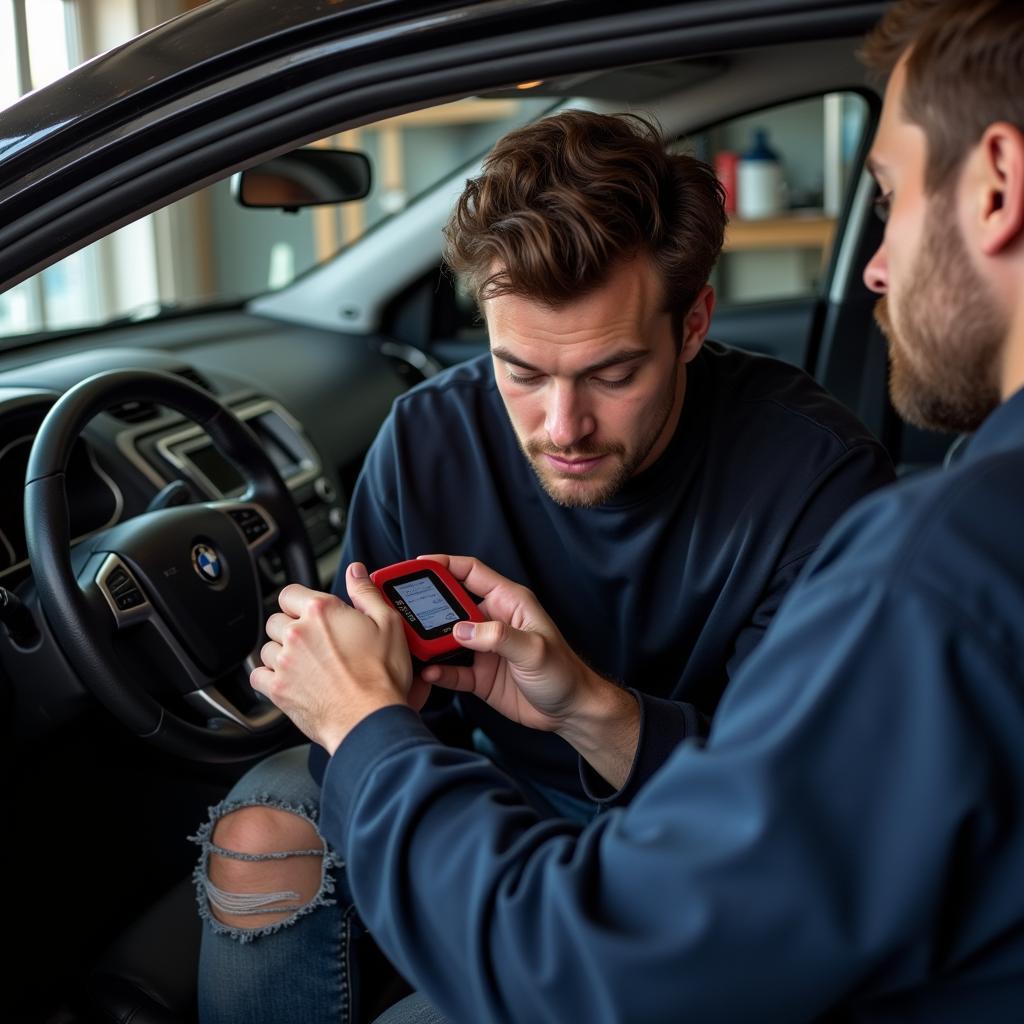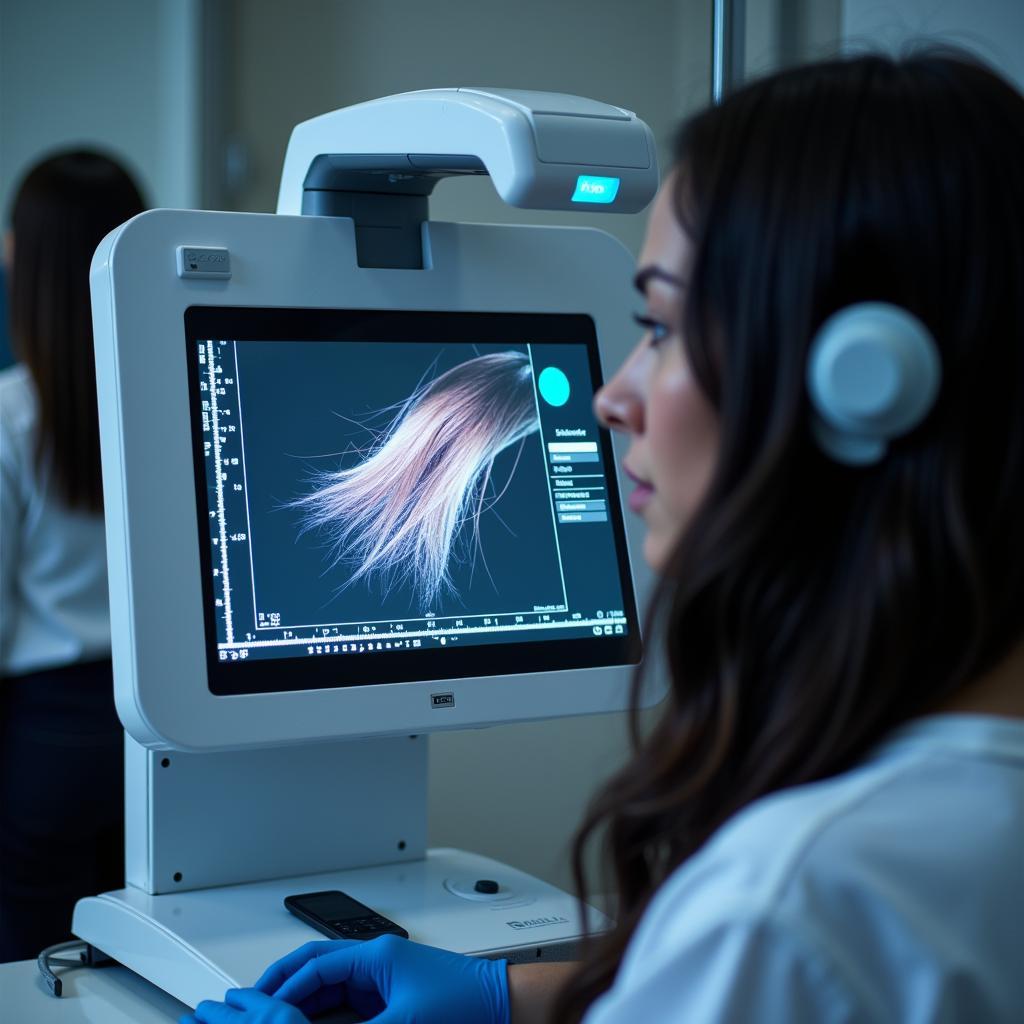In today’s digital age, even car troubles have gone high-tech. Gone are the days of relying solely on mechanics for a diagnosis. Enter the Mini Car Scanner, a pocket-sized powerhouse that empowers car owners to understand their vehicles better. This device acts as a direct line of communication between your car and you, translating cryptic engine codes into understandable information.
But with so many options available, choosing the right mini car scanner can be daunting. This comprehensive guide will equip you with the knowledge to make an informed decision, whether you’re a DIY enthusiast or a seasoned mechanic.
Why You Need a Mini Car Scanner
 Mini Car Scanner Connected to Car
Mini Car Scanner Connected to Car
Imagine this: Your check engine light illuminates, sending a wave of uncertainty. Instead of rushing to a mechanic, you grab your mini car scanner, plug it into your car’s OBD-II port, and within seconds, you have a clear understanding of the problem.
Mini car scanners offer a multitude of benefits:
- Early Problem Detection: Identify minor issues before they escalate into costly repairs.
- Save Money: Reduce expenses on unnecessary mechanic visits.
- Peace of Mind: Gain confidence in understanding your car’s health.
- Enhanced Control: Make informed decisions about your car’s maintenance.
- DIY Empowerment: Tackle basic repairs and maintenance yourself.
Choosing the Right Mini Car Scanner: Key Features
 Mechanic Using OBD Scanner for Mini
Mechanic Using OBD Scanner for Mini
Not all mini car scanners are created equal. Consider these essential features:
- Compatibility: Ensure the scanner is compatible with your car’s make, model, and year.
- OBD-II Coverage: Verify that the scanner supports all five OBD-II protocols for comprehensive diagnostics.
- Code Reading and Clearing: The scanner should be able to read and clear both generic and manufacturer-specific codes.
- Live Data Streaming: Access real-time engine parameters like speed, RPM, and temperature for advanced troubleshooting.
- User Interface: Opt for a scanner with a clear, intuitive display and easy-to-navigate menus.
- Additional Features: Some scanners offer extra features like ABS and airbag system diagnostics, battery voltage monitoring, and emission readiness checks.
- Connectivity: Choose between Bluetooth, Wi-Fi, or USB connectivity based on your preference.
- Software Updates: Regular updates ensure the scanner keeps up with the latest vehicle technology.
For those seeking a comprehensive diagnostic solution for their Mini Cooper or a hybrid vehicle, exploring options like an obd scanner for mini and hybrid cars can prove beneficial. These specialized scanners offer tailored functionality to address the unique diagnostic requirements of these car types.
Mini Car Scanners vs. Professional Scan Tools: What’s the Difference?
While mini car scanners provide valuable insights, they shouldn’t be mistaken for professional-grade scan tools used by mechanics. Here’s a breakdown of the key differences:
| Feature | Mini Car Scanner | Professional Scan Tool |
|---|---|---|
| Functionality | Basic to intermediate diagnostics | Advanced diagnostics and programming |
| Cost | Affordable | Expensive |
| User Interface | Simple and user-friendly | Complex and requires technical expertise |
| Coverage | Limited to engine and transmission codes | Comprehensive coverage of all vehicle systems |
| Updates | Less frequent | Regular updates with new features and vehicle coverage |
In essence, mini car scanners are ideal for DIY enthusiasts and car owners seeking to understand and address basic issues. For complex repairs, in-depth diagnostics, or software programming, seeking a qualified mechanic with professional scan tools is crucial.
Common Uses for a Mini Car Scanner
 Car Owner Using Mini Car Scanner
Car Owner Using Mini Car Scanner
- Diagnose Check Engine Light: Quickly identify the reason behind the dreaded warning light.
- Reset Check Engine Light: After addressing a problem, use the scanner to clear the code and turn off the light.
- Monitor Engine Performance: Track vital engine parameters in real-time to identify potential issues.
- Analyze Fuel Economy: Understand factors affecting your car’s fuel consumption.
- Check Emission Readiness: Ensure your vehicle is ready to pass an emissions test.
- DIY Repairs: Perform basic repairs and maintenance tasks with confidence.
Tips for Using a Mini Car Scanner
- Read the Manual: Familiarize yourself with your specific scanner’s features and functionality.
- Locate Your OBD-II Port: The port is typically located under the dashboard on the driver’s side.
- Turn Off Your Engine: Before connecting the scanner, ensure your engine is off.
- Interpret Codes Carefully: While the scanner provides code definitions, further research may be necessary.
- Don’t Ignore Warning Lights: Even after clearing a code, investigate the root cause of the problem.
If you’re interested in exploring software options to complement your scanner, a [car engine scanner software free download](https://scantoolus.com/car engine scanner software free download/) can offer additional features and analysis capabilities. These software solutions can provide more detailed insights into your vehicle’s data and enhance your diagnostic capabilities.
Mini Car Scanners: A Worthy Investment
“Investing in a mini car scanner is like having a personal mechanic in your pocket,” says John Smith, a certified automotive technician with over 20 years of experience. “It empowers car owners with knowledge and can potentially save them hundreds of dollars in unnecessary repairs.”
From diagnosing engine problems to monitoring car health, a mini car scanner is an indispensable tool for any car owner. Whether you’re a DIY enthusiast or simply want greater control over your vehicle’s well-being, a mini car scanner is a smart investment that pays for itself in peace of mind.
FAQ
1. Can I use a mini car scanner on any car?
Mini car scanners are generally compatible with vehicles manufactured after 1996 that are equipped with an OBD-II port. However, it’s essential to check for specific make and model compatibility before purchasing.
2. Are mini car scanners difficult to use?
Most mini car scanners are designed with user-friendliness in mind. They typically feature a straightforward interface with clear instructions.
3. What is the difference between a code reader and a scan tool?
While the terms are often used interchangeably, code readers generally offer basic code reading and clearing functionalities, while scan tools provide more advanced features like live data streaming and component activation.
4. Can I rely solely on a mini car scanner for car diagnostics?
Mini car scanners are excellent for initial diagnostics, but they shouldn’t replace the expertise of a qualified mechanic. For complex repairs or in-depth diagnostics, consulting a professional is recommended.
5. Do I need internet access to use a mini car scanner?
Most mini car scanners function offline. However, some advanced models may require an internet connection for software updates or accessing online databases for code definitions.
If you’re considering exploring a wider range of diagnostic tools, a comprehensive resource like an all car diagnostic scanner guide can provide valuable insights into different options available in the market.
Need Help Choosing the Right Mini Car Scanner?
At ScanToolUS, we’re dedicated to empowering car owners with the knowledge and tools to take control of their vehicle’s health. Contact us today at +1 (641) 206-8880 or visit our office at 1615 S Laramie Ave, Cicero, IL 60804, USA. We’ll help you find the perfect mini car scanner for your needs and budget.


Pingback: Diagnostic Scan Tool vs Code Reader: Which One Do You Need? - Car Scan Tool